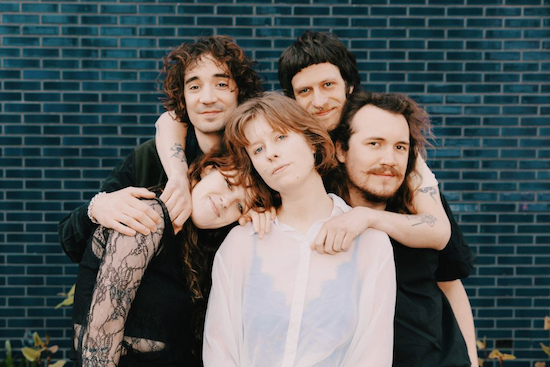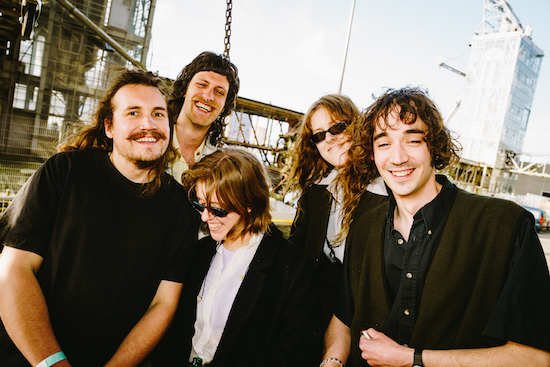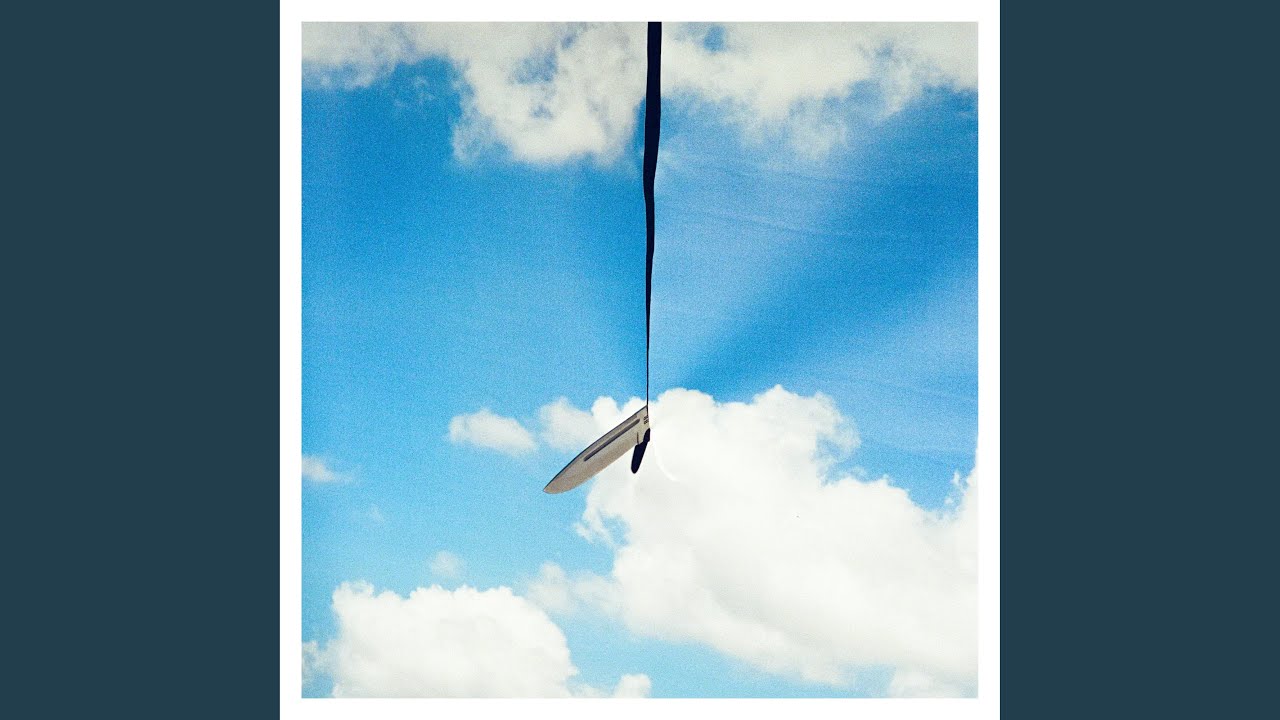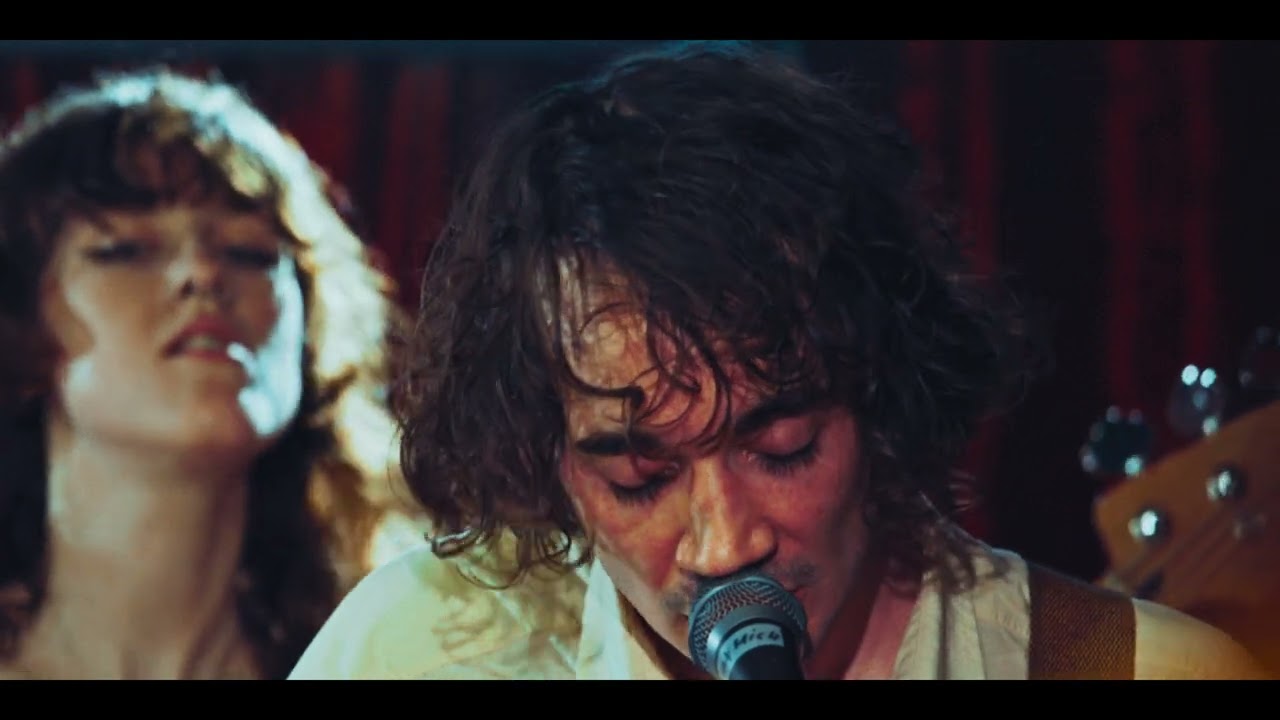Photo by Elmo Taihitu
Tramhaus, a noisy and mercurial post punk band from Rotterdam, repeatedly assure me they are indifferent to the delights of the music industry.
They will need fortitude in this: the interview takes shape at the famous ESNS showcase in Groningen (where the band, recently back from Japan, played a set full of spitting contempt to a hall full of braying delegates), and in their native Rotterdam, just after their first US and UK tours, and on the cusp of Baltic, French and German shows. Their early, punchy singles, released on the longstanding independent Subroutine Records, are long sold out. The debut album, The First Exit is eagerly anticipated this autumn on the same label. First single of the long player, ‘Beech’, is as expected; a vortex of catchy noise.
’Let’s Go Out And Have Some Fun’ (with Debord)
Polite, engaging and intelligent, the members of Tramhaus repeatedly tell me that none of “all this” matters, that their friendships are paramount, and that it wouldn’t be the end of the world if they split up. Bassist Julia Vroegh sees Tramhaus as “a platonic love affair between the five of us.” They are the kind of band to swap books on tour (Ten Thousand Apologies and Jingle Jangle Jungle the current favourites alongside Houellebecq’s The Possibilities Of An Island and Kelley’s A Different Drummer). When pressed on what they really want, guitarist Nadya Van Osnabrugge gives the table a thump. “We don’t have an end goal outside of having fun and making music that we like. It’s not about money or impressing people in The Netherlands or wherever. Or matching up with a company, so we can have their stuff. We aren’t a company, we are friends and we wanna make music. It’s going really well and it’s nice. But if we finish in a year or so, or people get bored of us, then fine.”
Though it’s not a compass for their collective personality, Tramhaus are from Rotterdam. ‘Poetsen, niet lullen’ (roughly translated as ‘stop moaning and get with it’) is indelibly etched on the city’s character, however gentrified it becomes. The band members are involved in all aspects of Tramhaus, and drummer Jim Luijten pours cold water on notions of them being part-time punks. “We are not out of touch with reality, we are not dreamers. We are hands-on and don’t expect things.” Unwittingly confirming this, Vroegh turns up to our second meeting carrying a bulky pile of new t-shirts, packed and ready to post. Luijten: “With everything – sorting shows, seeing gigs – we do it together: all five of us.” The five have just taken a collective decision to give up their jobs and concentrate on the band. A rare thing in the Netherlands. Vocalist Lukas Jansen: “We are very lucky we all can, right now, and that we actually all agreed to do it!” They are also lucky to have a supporting cast of like-minded people around them in Rotterdam and increasingly, Europe, who book, promote and watch the figures. But this wider family has to be friends first and foremost, and bring no bullshit promises into the camp.
It’s very easy to get excited by Tramhaus’ onstage antics and their shifting, noisy music, and by the fact that they never really play the same set twice. It is also very tempting to project ideas onto them. Watching them these last couple of years I can’t help thinking their genius is to reverse Debord’s The Society Of The Spectacle for the rest of us, where we in the crowd see our state of “appearing” morph into “being,” via “having” a good time. When I ask if they are situationists, they cheer, though whether they wittingly set out to perform such principles is another matter. Guitarist Micha Zaat, a thoughtful soul who one could never imagine as having played in Rotterdam punk monsters, Pig Frenzy, quietly interjects. “All music is an artform that is also entertainment, and I think that we take that with us. During our shows you can see that we think about stuff, but at the same time we don’t really want to push our intelligence onto our music because it would miss the point. It’s there to entertain a crowd, it’s about having a good time.” Vroegh reaffirms the point by pointing to the opposite. “With some acts we see, it’s almost like they’re playing as a video. It’s as if it doesn’t matter what the crowd wants, it’s like pressing play… That is very scary for us.”
The People Show
One thing is crystal clear: Tramhaus understand the power of connection. They like to feel what their audience feels, and play with it. They know that onstage is where magical warfare is mapped out. They feel each other’s stomping and preening onstage, and watch their pedals and mics judder and slide to their collective movements. Van Osnabrugge gives our table another thump: “When we are onstage, it’s our territory and we want to deal with it how we like.” Zaat adds, “We are willing to do things that may not be seen as rock or punk, or what we are expected to do.” An awful lot of this is down to their electrifying singer. Offstage Jansen is a model gentleman, charming and courteous. When noisily treading the boards, he is a conductor for the band’s mood, and sometimes – to nod to Debord again – an “engineer of radically different situations from which to reflect.” Jansen sees Tramhaus as “not really a statement band” but one with “some very strong emotions: we sing about topics that are political, heavy or emotional. But also we are having tons of fun on stage and we love each other very much, and I think that makes it hard for some to put a finger on us.”

Photo by Michele Margot
Zaat adds that ad libbing onstage is “a natural reaction to the night, and it depends on the crowd as well. It’s a game you play.” Including the option of “taking your clothes off” at gigs with “terrible crowds”. Vroegh remembers “a desperate audience; chatting, with their backs to the stage. I remember Lukas taking his shoes off to start with – I thought, ‘What’s he up to,’ and then the pants came off and the shirt, and at one point [turns to Jansen] you were in front of the monitors in your underpants and screaming.” Jansen: “And still they ignored me!”
The act of interaction – as an affirmation of who they are – is also key to creating their recorded material. Zaat says he isn’t keen on seeing the new songs as evidence of “maturing”. “But I do feel like we are changing: evolving, let’s say that. The songs aren’t super fast any more, but we still have a lot of that diehard punk spirit.” Van Osnabrugge agrees. “Even with songs we wrote two years ago we can still get into their plot. We stay true to those old songs. We never say ‘Oh, we’re not those people any more.’ We would never say that.” Both Jansen and Luijten state the new record may have finally captured their titanic live sound, which, according to Jansen, “really makes the record good”. “But maybe this statement, ‘We found our live sound in the studio,’ will age like milk,” Luijten adds ruefully.
One could say Tramhaus’ music springs from an unspoken, collective mood that finds form in the practice space and studio, and then slowly takes shape on stage. No song has ever truly begun as a preconceived exercise in ‘writing in a particular way’. None are finished in terms of spirit, or shape, either; though Van Osnabrugge laughs that after touring, they “usually end up shorter.” Vroegh: “And it’s never like we would set out to write a song about a particular thing. It’s not objective in that way. It depends on what we are thinking on the day in the rehearsal space.” At a later point, Jansen adds that “lyric-wise, the new album is about being a young guy, growing up gay in a straight world. It wasn’t intentional, and I really didn’t think about it, as it was such a close topic for me, but once I started writing it went in that direction. I am very happy with it.”
Their music is “personal”, but also somewhat reactive to the things in everyday life they come across. Luijten: “And when we find a riff we like, that’s when we start. We often have a really small idea but we all build around the riff.” The band riffs a lot but then, Van Osnabrugge admits, “I only knew three chords when I started.”
Around the world
Though no member has seen Withnail And I, Tramhaus are – to use Uncle Monty’s dictum – a sponge. Recent festivals in Portugal, and tours in the UK, Japan and the States have probably started a set of shifts of collective mood and perception that may play out in new material. For now, we can record, à la Debord, the impressions they’ve soaked up. Vroegh, Zaat and Jansen talk about their increasing “observance” whilst on the road, and the “symbolism” that creeps into their music. Whether these impressions and observances become part of the Tramhaus spectacle over time is for the auguries.

Photo by Gus Van Der Aa
Right now, “what we do is so absurd” says Van Osnabrugge, talking of their determination to conquer all stages they play and the holiday spirit they feel when touring. Touring is primarily a stepping stone; to meet people and broaden minds and connections. The band continuously experience new spectacles to remake and remodel. The UK was marked by pouring rain and cold, where Luijten “froze his balls off” yet, two weeks later, the band were in the heat and sunshine of Texas, being wined and dined. The States felt more alien than Japan, though the welcome and hospitality was, it was agreed, genuine and overwhelming. They were shocked by the difference between the north and south of England, but were very taken by the antics of the revels in Blackpool; “a dystopian Scheveningen” where the uniformly skimpy clothing and party hard attitudes in the face of the cold lash of the Irish Sea made a big impression. “A glorious place,” according to Jansen.
Then there is Japan: a “fucking crazy place” where they felt “so barbaric”, and is “all about detail”. For a band totally wired for interacting with their audience, and boasting an attentive singer such as Jansen, playing a show for a different crowd each night meant a certain amount of freestyling, which is at odds with how rock music is presented and promoted there. Jansen: “What I found really funny is that a Japanese crowd wants you to show them how to react. It was written down in a review: someone wrote, ‘I wanted to know how I should behave, and I found out that it didn’t matter how I behaved’!’ What I did notice is that if I did ‘this’ [mimes a movement] the whole crowd did the same. The crowd caught on really quick. And the next show we played I thought, right I am really going to make use of this!” According to Luijten, “All the comedians from Japan come from Osaka. When we played there, people would really be singing along. When we played Tokyo, the crowds did that less.” But all the crowds paid attention. Vroegh: “It was as if the crowd were looking out for the rules, to do what we did.” Luijten: “And if we said, I want to see a mosh pit during this song, the audience would.”
Here’s to more collective absurdity.
Tramhaus’ debut album The First Exit is released on 20 September via Subroutine Records, followed by an extensive European tour. The band also perform a number of festival shows this summer. For full dates, click here
.




